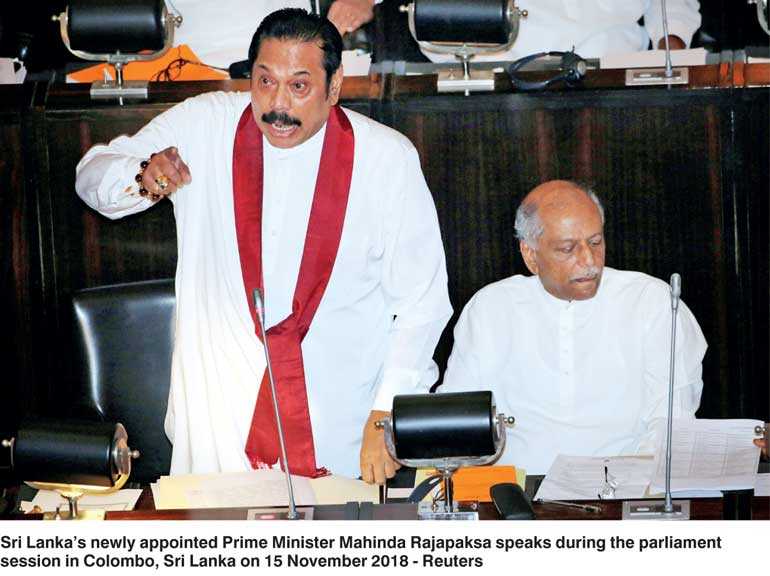Thursday Feb 19, 2026
Thursday Feb 19, 2026
Monday, 19 November 2018 00:00 - - {{hitsCtrl.values.hits}}

By Sonya Sceats
www.theguardian.com: The dangers of a return to power of Mahinda Rajapaksa cannot be overstated. When he was president, torture in Sri Lanka was routine.
Tens of thousands of civilians were killed in just a few months at the end of the civil war in 2009, in what his government cynically referred to as a “no-fire zone”. It was, as the UN later noted, a “grave assault on the entire regime of international law”.
President Maithripala Sirisena, his successor, was never the human rights champion he claimed to be, and it was foolish of western governments to buy this lie. Now Sirisena’s political coup to bring the despotic Rajapaksa back into power has jeopardised even modest steps towards reconciliation.
Whatever emerges in the short term from the current political chaos, we face the real possibility that a man who presided over mass torture and enforced disappearances will again hold the reins of power. In the words of one Sri Lankan activist last week: “There is increasing fear.” On no account should the UK send people back to the risk of torture and ill-treatment there, as it has repeatedly done before.
There is probably no person on Earth more responsible than Rajapaksa for the broken lives that Freedom from Torture attempts to fix at our torture treatment centres in the UK. For seven years running, Sri Lanka has been the top country of origin for people referred to us. Last year alone, we provided care to more than 230 Sri Lankans, the vast majority of whom were tortured under Rajapaksa’s rule. Most of those we see are Tamil, but some are Sinhalese or of mixed ethnicity.
Rajapaksa built his torture machinery to last and the truth is that Sirisena has kept it well oiled. Should Rajapaksa return to high office, the merest of nods would suffice for his old operatives, many of whom are still in the system, to crank it up again. Military and police chiefs are reportedly already paying visits to him.
We have previously sounded the alarm about the risks of torture facing Tamils returning to Sri Lanka from the UK since the civil war if they had, or are thought to have had, associations with the militant Tamil Tigers, even at the very lowest levels or via family members or other contacts.
The official antipathy towards the Tamil diaspora was displayed earlier this year by a Sri Lankan defence attaché caught on film making a throat-slitting gesture to Tamil protesters in London. This was not an empty threat.
Our specialist doctors have forensically documented more than 80 cases of people tortured after returning to Sri Lanka from the UK after the conflict, most of whom report being interrogated about their reasons for being in the UK, their activities and their networks. Most returned to Sri Lanka voluntarily, but some were forced back after rejection of asylum claims.
The British government is rightly calling on Sri Lankan politicians to uphold the constitution and human rights, but dispensing advice to Colombo is not enough. The clear and present risk of escalating repression and our specific evidence of torture on return from the UK requires a halt to removals and an urgent review of the Home Office’s asylum policy on Sri Lanka to match our evidence of who is likely to be targeted.
Tamil survivors in treatment always resented pressure from western diplomats to dampen their demands for international justice in the interests of peace. They knew this would mean no justice at all and the risk that those most responsible for atrocities would regroup and plunge the country back into chaos. Sirisena’s pact with Rajapaksa proves them right.
More diplomacy is needed to restore the rule of law and hold Sri Lanka to the deal it struck at the UN to underpin the peace. But a moratorium on removals is a simple step for the UK to take now to ensure that we do not deliver anyone into Rajapaksa’s lethal hands.
(The writer is chief executive of Freedom from Torture.)